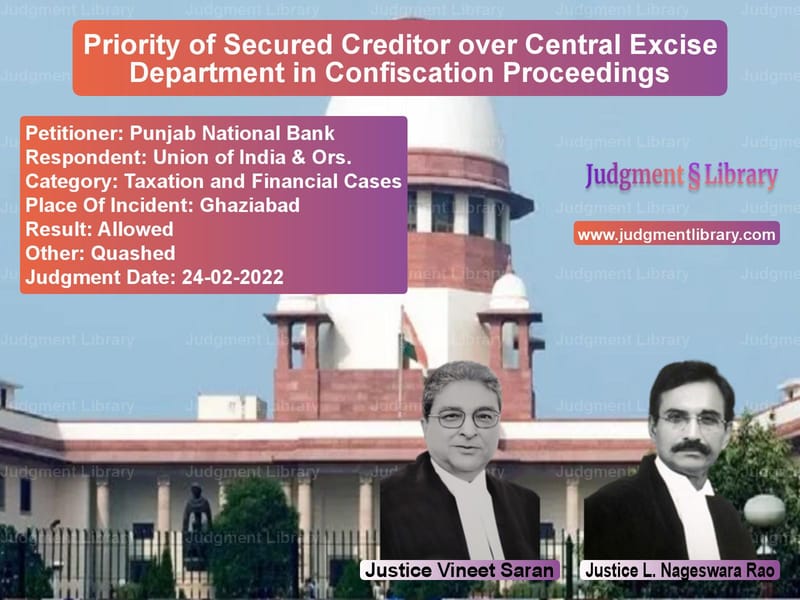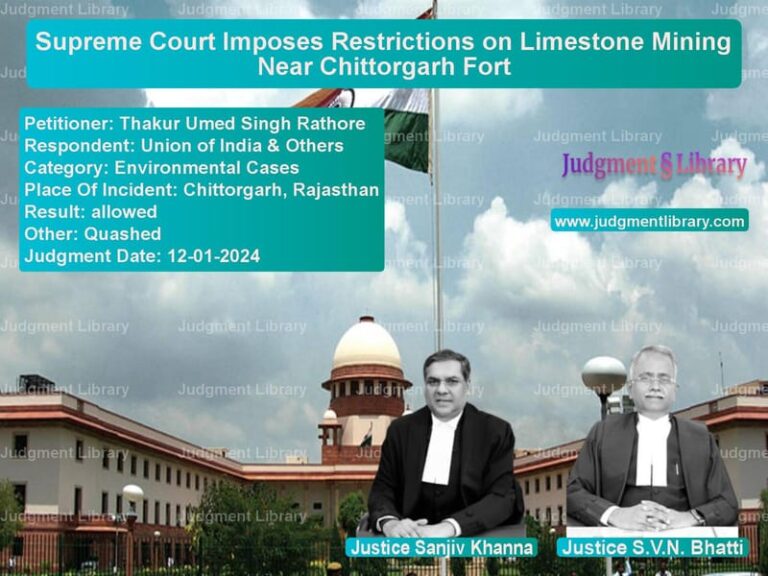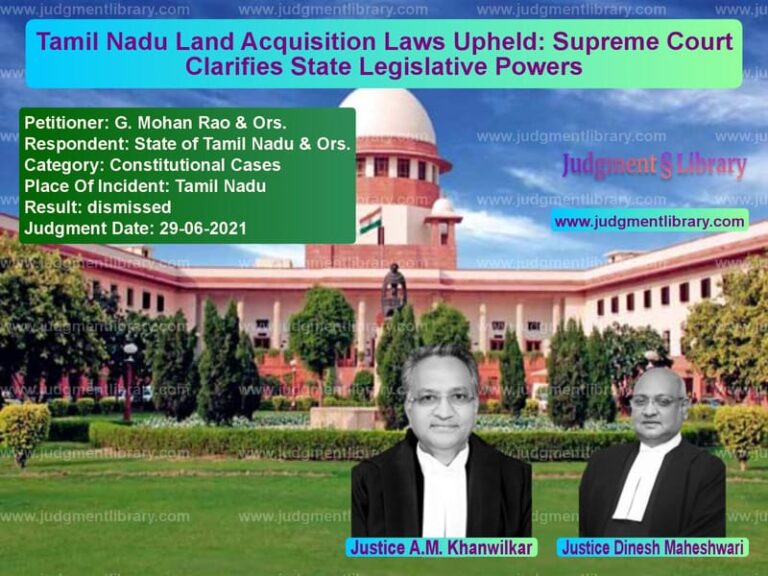Priority of Secured Creditor over Central Excise Department in Confiscation Proceedings
The present Civil Appeal arises out of the judgment and order passed by the Allahabad High Court, wherein the writ petition filed by the Appellant was dismissed. The case revolves around the confiscation of movable and immovable properties of Rathi Ispat Ltd. (RIL) under the Central Excise Rules, 1944, and the issue of whether the Appellant, a secured creditor, could assert its rights over those properties despite the ongoing confiscation proceedings initiated by the Customs and Central Excise authorities.
The facts of the case are that the Customs and Central Excise Department issued a show-cause notice against RIL for evasion of excise duty and violation of the Central Excise Act, 1944. The department confirmed a demand for excise duty amounting to several crores of rupees and imposed penalties, including confiscation of RIL’s land, buildings, plant, machinery, and materials. This was done under Rule 173Q(2) of the Central Excise Rules, 1944, which was later omitted in 2000. The Appellant bank, Punjab National Bank, had provided financial facilities to RIL and had taken a charge on its assets, including land, buildings, and machinery.
However, in light of RIL’s default in repaying the loan, the Appellant bank issued notices under the SARFAESI Act, 2002, and took symbolic possession of the mortgaged properties. The Customs and Central Excise authorities objected to this, claiming that the properties were already confiscated, and therefore the bank could not assert its rights over them.
The main issue before the Court was whether the Commissioner of Customs and Central Excise could have invoked the powers under Rule 173Q(2) of the Central Excise Rules, 1944, to confiscate properties when this provision had already been omitted from the statute books. Another issue raised was the priority of the Appellant bank’s rights as a secured creditor over the dues owed to the Excise Department.
The Appellant bank argued that the orders of confiscation passed under the omitted Rule 173Q(2) were invalid, as the provision had been removed from the statute before the orders were issued. Furthermore, the Appellant bank contended that its rights as a secured creditor, based on the mortgage of RIL’s properties, should take precedence over the government’s excise dues. The bank cited several case laws to support the argument that Crown debts (such as excise duties) do not take precedence over secured creditors’ claims unless there is a specific provision for first charge in the law.
The Respondents, however, argued that the confiscation orders were valid, as the proceedings were initiated well before the omission of Rule 173Q(2), and the provisions of Section 38A of the Central Excise Act, 1944, allowed the continuation of such proceedings. They further contended that the Excise Department’s dues, being government dues, had priority over the claims of secured creditors.
The Court examined both the legislative intent behind the omission of Rule 173Q(2) and the provisions of the SARFAESI Act, 2002. It was observed that the excise rules had not been amended to provide for the confiscation of immovable property like land and buildings after the omission of Rule 173Q(2). Moreover, the Court noted that Section 35 of the SARFAESI Act, 2002, gives secured creditors priority over other debts, including government dues, provided there is no specific first charge under the law.
The Court ultimately ruled in favor of the Appellant bank, quashing the confiscation orders passed by the Commissioner of Customs and Central Excise. It held that the confiscation proceedings were invalid as they were based on a provision that no longer existed in the statute. Furthermore, the Court affirmed the principle that secured creditors’ claims take precedence over Crown debts in the absence of specific provisions giving the government first charge over the property. The Court’s decision was supported by several precedents that upheld the rights of secured creditors over government dues in similar cases.
In conclusion, the Court emphasized the importance of ensuring that the rights of secured creditors are not undermined by proceedings that lack statutory backing, and it reinforced the overriding effect of the SARFAESI Act, 2002, in matters of enforcement of security interests.
Petitioner Name: Punjab National Bank.Respondent Name: Union of India & Ors..Judgment By: Justice Vineet Saran, Justice L. Nageswara Rao.Place Of Incident: Ghaziabad.Judgment Date: 24-02-2022.
Don’t miss out on the full details! Download the complete judgment in PDF format below and gain valuable insights instantly!
Download Judgment: punjab-national-bank-vs-union-of-india-&-ors-supreme-court-of-india-judgment-dated-24-02-2022.pdf
Directly Download Judgment: Directly download this Judgment
See all petitions in Employment Disputes
See all petitions in Pension and Gratuity
See all petitions in Workplace Harassment
See all petitions in Debt Recovery
See all petitions in Damages and Compensation
See all petitions in Judgment by Vineet Saran
See all petitions in Judgment by L. Nageswara Rao
See all petitions in allowed
See all petitions in Quashed
See all petitions in supreme court of India judgments February 2022
See all petitions in 2022 judgments
See all posts in Taxation and Financial Cases Category
See all allowed petitions in Taxation and Financial Cases Category
See all Dismissed petitions in Taxation and Financial Cases Category
See all partially allowed petitions in Taxation and Financial Cases Category







